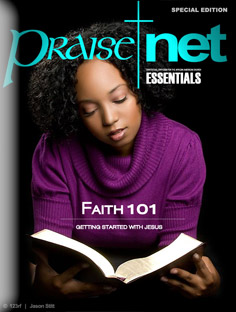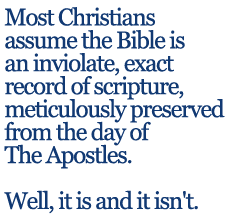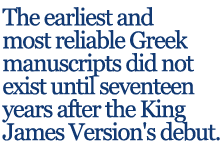
If our belief is based on the Bible, and the Bible could mean almost anything, given a minimum of fourteen centuries of handwritten transcription and another six or so of old men voting on the meaning and relevance of scripture, how do we now find God in any of this? How do we find the incorruptible amid the corruptible? The Truth in the midst of everybody's opinion? Bottom line: can we trust this thing?
![]() I know nothing and less than nothing
I know nothing and less than nothing
about Textual Criticism, Manuscript Tradition, Hermeneutics or
Orthogonal Deductive Reasoning. The truth is, I can barely
program my VCR. I am the absolute last guy you should be taking
pastoral instruction from. My intent here is to (a) get us to at
least think about these issues, and (b) get things off my chest.
Mostly (b). Try not to confuse any of that with divine
revelation or some special anointing. I'm just another guy with
another website, ranting on about things he knows maybe a tenth
of what he should to even begin discussing them intelligently.
This essay barely scratches the surface of a subject so complex
it requires volumes of writing and years of study. The study of
Biblical Errancy, Historical Theology and Textual Criticism is
one scholars devote entire lifetimes to. My little pop culture
Cracker Jack Surprise Toy page, here, should hardly be
represented or accepted as a serious work other than in the
asking of the question: Is the Bible reliable?
I am frequently accosted by zealous Christians, more often than
not from the black Church, over the relevance and authority of
the Authorized King James Version of the Bible. I have been
admonished about reading other translations (such as the
wonderful New International Version) or paraphrases (such as The
Book or The Living Bible) in official church functions. The
poetically cryptic language of the 17th century translation is
the only voice of any authority within most black churches, and
a great many of our parishioners— especially the elders— do not
even accept scripture read from another translation, and will
often ask to have it re-read in the “real” Bible, the King
James. And not the New King James, either, buddy. The Real Deal.
Released in 1611 with 80 books (later revised in 1884, deleting
the Apocrypha as more ancient manuscripts became available), and
certified by England's King James I, The Holy Bible, Authorized
King James Version, has of course, stood the test of time as the
standard by which all Bibles are judged. Created to be the
peoples' Bible, the KJV was written in a common conversational
tongue, with the reams of theological footnotes of the previous
Bishop's Bible deleted, and designed for personal use, which the
king himself endorsed and encouraged his subjects to do. 48
scholars worked seven years to complete the massive project,
painstakingly comparing original texts and existing translations
to arrive at what is considered the hallmark for Biblical
accuracy and scriptural integrity. To describe the KJV as
anything less than magnificent is to do it a grave injustice,
and our purpose should never be to discourage anyone from
continuing to embrace this wondrous work.
I am concerned, however, by our church's fanatical obsession
with the translation to the exclusion of and hostility towards
all others, and by a pervasive ignorance about the volume and
how it came to be. When I ask them why they consider the KJV the
“real” Bible, they really can't answer. Not one of these zealots
can tell me, in even broad terms, how the KJV came to be. The
most common reply is typically the most egregiously wrong, “The
KJV is the most accurate.” The KJV refers to Unicorns nine
times: Numbers 23:22, 24:3, Deuteronomy 33:17, Job 39:9, 29,
Psalm 22:21, 29:6, 92:10, and Isaiah 34:7. The 1611 KJV has the
following note in the margin at Isaiah 34:7: “Or, rhinoceros.”
These renderings seem to be the result of the influence of the
Greek Septuagint, which used “monokeros,” and the Latin Vulgate,
which used “unicornis” or “rhinoceros.”
That's when I figured it out: apparently, these lovely people
who, by the way, don't actually read this or any Bible, don't
trust any translation written by people who could have possibly
driven cars. The invention of the automobile seems the litmus
test by which these folks can determine when a thing is holy.
The pervasive trend among our Church Folk is an irrational
mistrust of anything progressive or even contemporary; an
irresistible tow towards Yestertime, as Yestertime represents
for them The Incorruptible Good. The rule of thumb seems to be,
if they can actually understand what the scripture is saying,
they don't trust it.
I admit, I have recently fallen in love with the language of the
KJV. It's taken me a long time to do it. For more than two
decades I refused to read it, on the grounds that we as a people
must move beyond the archaic language that befuddles most people
and is totally alien to the young. I felt, and still believe, if
God be God, then, surely, we can speak to Him in a language we
actually understand. It both amuses and saddens me that, every
Sunday, our great learned deacons stand before us praying— in
the King James. In really bad King James. Lots of “thee's” and
“thou's” and “O Mighty Father Wherfore's” and such. I think, if
I were God, I'd be really ticked off. The respect is certainly
nice, but the reversion to laughable attempts at Shakespearean
syntax are wholly disingenuous and suggest God is too stupid to
know what we are saying.
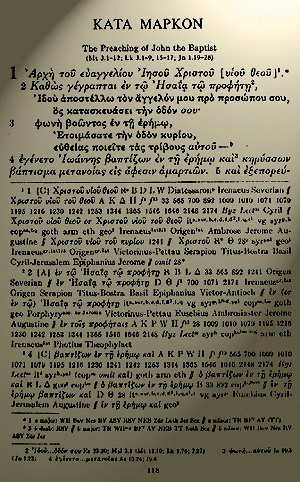
The Gospel of Mark taken from The Greek New Testament edited by Kurt Aland, Matthew Black, Carlo M Martini, Bruce M Metzger & Allen Wikgren. Note that it provides lots of information on the textual variants and their relative degree of certainty which are needed for the translation than the Novum Testamentum Graece Cum Apparatu Critico Curavit, by Erwin Nestle and Kurt Aland. [3]
“And there came an angel of the Lord, and sat under an oak,
which was in Ophrah, that pertained unto Joash the Abi-ezrite:
and his son Gideon threshed wheat by the winepress, to hide it
from the Midianites.” —Judges 6:11, Authorized King James
Version
What the heck did I just read?! I read this as part of a sermon,
and everyone's eyes glazed over, until I explained what the
verse said, in modern language:
“The angel of the Lord came and sat down under the oak in Ophrah
that belonged to Joash the Abiezrite, where his son Gideon was
threshing wheat in the winepress to keep it from the Midianites.”
—Judges 6:11 New International Version
Oh. Why didn't you say that in the first place?! It's been my
experience that, if Church Folk can understand the scripture
you've just read, they will not accept it. If the translation is
a modern one, they will be suspicious of it. They will take
absolutely no comfort in the Word of God unless it is delivered
in a somber tone and parsed in phrases of archaic language that
they can barely understand. It's got to sound religious, or they
won't buy into it. I'm sure if I read from the Latin Vulgate,
that would have more authority to them than The Living Bible.
It is high on a very long list of what's wrong with Church Folk
and how religion has absolutely failed us. The notion that
something being old makes it somehow less prone to error and
corruption is absolutely laughable. But, that's the goods we've
been sold: the KJV is nearly 400 years old, so it must be
correct. It is the only version without error. It is the
definitive version of the Bible. The men who translated it
didn't own cars. It's the Bible the Disciples used.
The irrational, uninformed devotion to this translation of the
Bible is the high water mark of ignorance, the Ostrich Method of
Historical Theology, a terrifyingly blind faith in an archaic
manuscript which was, ironically, created for the purpose of
modernizing the Bible into contemporary language of the day.
This KJV-Only!” mentality contradicts the wishes of that Bible's
own translators, who wrote in the introduction, that, “...a
variety of Translations is profitable for the finding out of the
sense of the Scriptures.”
For me, God's Word is Holy in any language and in any
translation. In spite of the many problems that arise upon any
reasonable study of how this Bible came to be, I prefer to keep
my eye on the ball: the essence, purpose, and meaning of God's
Word, the intent of the authors in preserving and defending it,
and it's value to us as children of God.
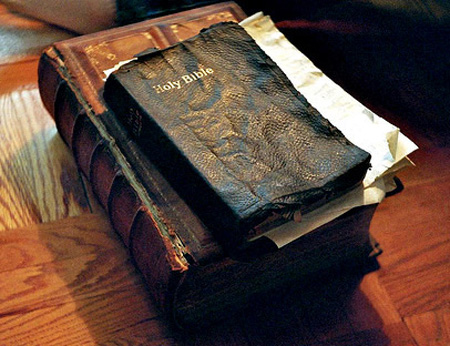
But, how did it get here?
In the most benignly optimistic vision of how things happened,
the Bible came to be by inspiration of God, was passed down
through generations unaltered and inerrant, in Hebrew (the
Torah, or Old Testament), Greek (Septuagint, 285 BC, The Codex
Alexandrinus, 425 AD), Latin (Vulgate, 400 AD) and others. The
Bible was finally struck in English in 1380 by John Wycliffe and
in 1530 by William Tyndale, who was martyred in retaliation for
bringing the Bible to the common man. The Bible was recorded in
quantity with the advent of Gutenberg's press in 1450, and The
Word continued to be held inviolate for generations after that,
until it was finally translated in 1611 into the Authorized King
James Version, undoubtedly the standard-bearer of all Bibles
today. Many of my friends consider the KJV the definitive and
unaltered Word of God, exactly as it was conceived during the
Apostolic Age. Believing this, in this book, requires an
enormous leap of faith and a childlike naiveté, as well as a
blind eye and deaf ear to an even reasonable investigation into
historical theology.
Most Christians assume the Bible is an inviolate, exact record
of scripture, meticulously preserved from the day of The
Apostles. While the Torah, our Old Testament, was indeed
preserved over the centuries in the Greek Septuagint, the more
controversial Masoretic Text, the Latin Vulgate and other
corroborating documents, New Testament manuscripts, the
foundation of the Christian Church, were handled many times over
many centuries by mere mortals who, even those possessed of the
very best of intentions, were prone to error, and prone to
interpreting the scriptures to conform to doctrines and
manuscript styles of their day.
Thus, we have the study of Manuscript Tradition. Every handwritten copy of a book is textually unique, revealing things about its author or copyist. Manuscript Tradition involves establishing the relationship of every transmitted copy of a text and comparing it to other copies of the work, and other works of the manuscript author, to determine the work's authenticity. A critical examination of any given document's Manuscript Tradition provides clues as to when and where it was written, if not by whom. And these clues go a long way to authenticate or discredit documents presented as scriptural text. CONTINUED

